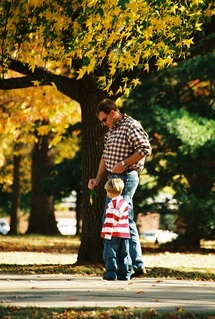 Your home contains countless skill-learning opportunities for your young child. You can make each room and each item in the room a learning activity for him if you simply stop for a few moments to show him how something works and let him try it for himself. Listening to explanations, trying out new things, and learning to use something for the first time help children develop both physically and intellectually. Taking care of things One skill that toddlers and preschoolers need is learning how to take proper care of their belongings and surroundings. Make a place for toys to go after they are played with, for clothes to go when they’re not being worn. Then help your child get in the habit of picking up his things when he is done, and hanging up his jackets, folding and putting away his pajamas in the morning, etc. Make learning these habits fun by being lavish with your praise for a job well done. Orderly surroundings give young children a greater sense of security and help them get an early start in forming good habits of their own. Your child’s environment will have a direct effect on his spirit (and yours too), so try to keep it clean, bright, and cheerful. Involving your small child in maintaining that order, beginning with little things, teaches him responsibility for himself and his surroundings. Helping him learn to perform the skills and tasks needed in everyday life also helps him learn new skills, improves his coordination, and teaches him consideration for others. Small children are usually very happy to help around the home and can assist in many needed chores that provide learning experiences. Teach your toddler the art of moving things, such as his small table and chairs, safely, skillfully, and quietly. Teach him to count as he hands you clothespins while you hang up the laundry. Let him help Daddy wash the car. Teach him about food, vitamins, and the importance of cleanliness as he helps prepare the salad for dinner. Daily household chores can be fun learning activities for little children: dumping the waste baskets, cleaning, tidying, sweeping, polishing, dusting, folding clothes, setting tables, washing dishes and clothes, and making beds. When it’s time to clean his room, your toddler or preschooler can help wipe down his toy shelf and wash the plastic toys. Low hooks and shelves for his towel, washcloth, soap, toothbrush, and clothing can turn a dependent, whiny child into a more content and helpful one! Teach your child the proper way to do each task from start to finish. Studying all the different aspects of folding clothes or wiping up dust is very interesting, even absorbing, to a child of two and a half to four years old. He will need time to learn to do it himself. His first tries can’t be expected to be too proficient, but children will gladly try to imitate the correct way of doing things if they are carefully shown how to. Take a “childview” of life Remember that a child often has a different reason than an adult would have for doing something. Often he simply enjoys doing the activity and is not as outcome-motivated as adults tend to be. The activity itself is often reason enough for doing something; finishing what he starts is not so important to him. Sometimes adults become impatient with children for their slowness in doing a task. They can’t see why a child doesn’t just hurry up and finish what he is doing. The child may have a very good attention span for his age, but he may not be focusing his attention on the same thing you are. You may want him to finish some activity because you need to move on to something else, but he may not be so interested in rushing through a perfectly enjoyable activity or moment just to begin something else. If you need to hurry him along, you should take time to explain why you want him to speed up, and how he also will benefit. Try not to rush your child through his day and constantly be pulling him away from absorbing things he is engaged in. Give children time to learn, time to observe, explore, and experience. Don’t rush them through a nature walk, or you may miss something very important. Take full advantage of God’s creation: the sights and sounds, creatures small and great, wind and weather, sunshine and rain. Think back and remember what experiences you had as a child that stand out in your memory, such as going barefoot in rain puddles, or pretending leaves in the tiny stream were boats on a wild river. Give children time and opportunity to learn from the greatest teacher of all—the Creator and His creation. Excerpts of the book "Keys to Toddlers and Preschoolers" by Derek and Michelle Brooks. © Aurora Productions. Used with permission.
0 Comments
Leave a Reply. |
Categories
All
Archives
March 2024
LinksFree Children's Stories |

 RSS Feed
RSS Feed
